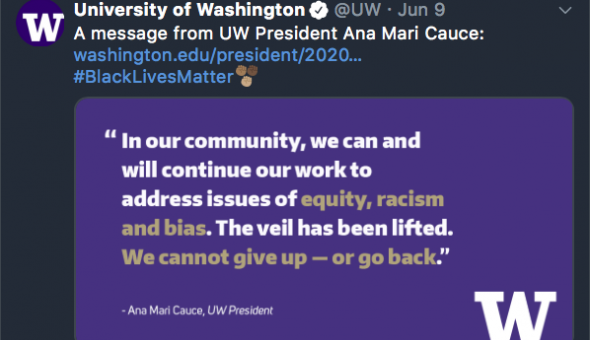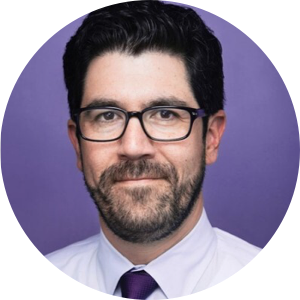Q: How is UW addressing the Black Lives Matter protests across the country, and what messaging is it putting out there to inform students of how it is supporting them?
A: We are listening and taking action. This isn’t a moment for only trying to say the right thing. It’s about hearing our students’ concerns about representation, about academic support, faculty and student diversity, policing practices, and taking real action – or sharing detailed plans with concrete steps and timelines – to address them. And we are taking steps to address these issues, and communicating about them as we do.

Q: Are there any online actions the school is taking to encourage, facilitate or moderate constructive dialogue around race?
A: Our Race & Equity Initiative has and continues to provide anti-racism resources and other guidance on facilitating conversations and helping materials. The bottom line is that action is needed. The existence of structural and institutional racism is not new, but the cultural moment prompted by recent, high-profile murders of Black men and women are forcing another long-overdue reckoning with the inequities that persist.
The open rates on emails to students, faculty and staff reflect that they appreciate and read the thorough information we’re providing.
Q: Regarding the evolving Covid-19 situation, what criteria is UW evaluating as far as if and how it will return students to campus this fall, and how prepared do you feel UW is to offer a comprehensive online or hybrid learning environment for students this fall?
A: We are following the guidance of our own public health experts and local health agencies regarding physical distancing and room-capacity requirements with regard to what is feasible in terms of bringing back any degree of in-person instruction. We are doing a complete review of our class schedule to determine which classes are most vital to be taught in person versus remotely, and prioritizing those. We conducted an inventory of our classroom space and sizes, and are moving classes that will be in-person into larger spaces to ensure appropriate physical distancing. Given the time we have had to prepare, we are confident we can provide a safe and effective learning environment for our students, faculty and staff. We can’t claim it will be perfect, but we will address issues quickly as they arise.
Q: How has your admissions marketing been affected by the pandemic, and how has UW adopted or increased its reliance on tools like virtual tours, chatbots, marketing automation platforms, and other tools?
A: Canceling all in-person events required us to enhance our virtual presence to create live, “simulive” and on-demand content in a branded environment, renewing our self-guided virtual tour, consolidating all prospective student videos onto a new “video tour” website, enabling chat with current tour guides and more.

Q: In terms of COVID, What communication channels is UW using most to update current and prospective students about your planning for the fall semester?
A: We send frequent and regular updates as we have news to share via messages from our President, social media and other communications through our admissions office to respond to inquiries from incoming students. We also have very comprehensive FAQ pages regarding COVID-19 and its impact on various areas of importance to students, faculty and staff – from instructional plans, financial aid and grading accommodations for students to leave options, face-covering guidelines and classroom and lab protocols for faculty and staff.
Q: We’ve heard anecdotally that students are relying on email much more than they are on social media for those updates – have you found that to be the case?
A: It’s fair to say we are utilizing email more than social media for these updates, likely because there is a large amount of information and nuance to what we need to communicate. This moment and its impact on our normal practices requires more explanation and detail than what can easily be communicated through social media channels, and the open rates on emails to students, faculty and staff reflect that they appreciate and read the thorough information we’re providing.
This isn’t a moment for only trying to say the right thing. It’s about taking real action.
Q: What reactions and questions are you hearing from parents, including any of their thoughts on gap semesters or years? And what channels are you using to reach them, including any differences from where you’re reaching students?
A: Prior to the May 1 confirmation date we had some questions about deferring enrollment a year, but fewer than we anticipated. To address some of the trending questions we’re receiving, we created a COVID-19 Admissions FAQ page. We continue to rely on email to communicate with prospects and their influencers, and recently hosted a live panel on the admission holistic review in light of COVID-19.
Q: How has your media strategy changed for international students? What kinds of messaging are you using to address their concerns and uncertainty?
A: We are very concerned about any potential backlash or discrimination that international students might be experiencing right now. We are working with them through our international student services office and other areas within Student Life. As far as the coronavirus, we our International Student Services team has been responsive to concerns shared over email and has provided several FAQ responses on its website. We also have a group called CIRCLE (the Center for International Relations & Cultural Leadership Exchange) within Student Life that has been responsive to international students via social media (Facebook, Instagram and WeChat, primarily).
Q: UW researchers have helped to create some of the statistical data and modeling that are driving decision-making at the state and national levels. Does that work make school administrators feel a little more plugged into what is going on and enable them to make decisions for reopening?
A: We are certainly fortunate to have world-class expertise right here on (or working remotely very near!) our campuses. Our public health experts are working directly with city, county and state officials on the local response, our Virology Lab created one of the first effective COVID-19 tests and has partnered with the city of Seattle to conduct free testing sites, while the UW’s Institute for Health Metrics & Evaluation is providing real-time projections that are informing policymakers around the world. While this expertise is tremendously helpful to our decision making, we recognize that our campuses do not exist in a vacuum and believe the best way to ensure our campuses are safe is to ensure the entire community around us is safe.










